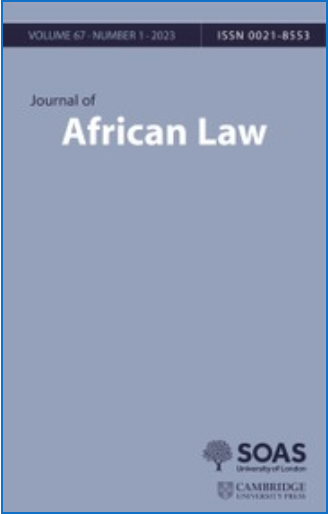Professor Chidi Oguamanam’s reflections in advance of WIPO’s IGC 47.
Read MoreJournal of African Law
Vol. 67, Issue 1 (February 2023)
Smart Agricultural Technology
Vol. 3 (February 2023)
African Journal of Legal Studies
Vol. 15, Issue 1 (January 2023)
A Conceptual Analysis and Strategic Framework for Governance
Read MoreBetween February 27 and March 3, 2023, delegates and experts are reconvening in Geneva for the 46th session of the World Intellectual Property Organization’s Intergovernmental Committee on Intellectual Property and Genetic Resources, Traditional Knowledge and Folklore (IGC 46). The IGC 46 is the penultimate of four sessions exclusively dedicated to “undertake[ing] negotiations on TK and/or TCEs with a focus on addressing unresolved and cross-cutting issues and considering options for a draft legal instrument(s)”. Earlier negotiations on the TK/TCEs text were undertaken pursuant to IGC 44 and 45, and will be further explored finally in the 2022-2023 biennium at the IGC 47 slated for June/July 2023. IGC 47 will also include stocktaking and making recommendations on the subject of TK/TCEs for the 64th WIPO General Assembly in October 2023.
Read MoreBuoyed by the July 2022 WIPO 62nd General Assembly decision that endorsed a Diplomatic Conference on Genetic Resources (GR) and Associated Traditional Knowledge, delegates to the 45th Intergovernmental Committee (IGC) continued negotiations on the TK and TCEs texts. On December 5-9, 2022, negotiations on the two subject matters continued from the September 12-16, 2022 44th IGC. It is second of the series of negotiations to focus on TK/TCEs. At the 44th IGC, delegates took unofficial notice of the new Chair’s, Ms. Lillyclair Bellamy (Jamaica), determination to take a cue from the immediate past Chair, Ian Goss (Australia) to generate a Chair’s TK/TCE text to advance progress on TK/TCE negotiations. This decision, which did not come as surprise to delegates, has potential to replicate Goss’ experience of the Chair’s GR text based on which the 2024 Diplomatic Conference is being convened.
Read MoreProfessor Chidi Oguamanam has been named to the University of Ottawa's University Research Chair in Sustainable Bio-Innovation, Indigenous Knowledge Systems and Global Knowledge Governance. Research Chairs represent the University's top researchers and recognize their outstanding and important accomplishments.
Read MoreMay 30-June 3, 2022: Delegates met in-person and virtually at the World Intellectual Property Organization (WIPO) in Geneva to resume the second round of negotiations for the 2022-23 biennium of the WIPO Intergovernmental Committee on Intellectual Property and Genetic Resources, Traditional Knowledge and Folklore (WIPO-IGC). The meeting being the second in the ‘post-pandemic’ era was dedicated to negotiations on genetic resources. It was the last meeting on the subject under the 2022-2023 biennium. The remaining meetings of the Committee for the biennium are dedicated to Traditional Knowledge and Traditional Cultural Expressions (aka folklore).
Read MoreIndigenous peoples all over the world have adverse relationships with research and researchers. Historically, research involving Indigenous peoples is conducted at the intersection of colonialism and asymmetrical power relations amongst researchers, industries, colonial states, and other stakeholders. The importance of research in shaping the policy agenda for development, access to health, basic infrastructure and for the empowerment of communities for self-determination is not lost on Indigenous peoples. Indigenous peoples and many other local and marginalized communities have been proverbial guinea pigs for researchers, being ‘used’ as research subjects whose rights were abused without consequences. Regarded as docile subjects, their voices were hardly heard, making them one of the most researched and yet underrepresented demographics in research.
Read MoreFebruary 28-March 4, 2020: Delegates met virtually and in-person at the World Intellectual Property Organization in Geneva to resume the first round of negotiations for the 2022-23 biennium of the WIPO Intergovernmental Committee on Intellectual Property and Genetic Resources, Traditional Knowledge and Folklore (IGC). The meeting was in continuation of more than two-decades of work, most of which has been dedicated to negotiations of legal instrument(s) for the protection of traditional knowledge (TK) traditional cultural expressions (TCEs) and genetic resources (GR).
Read MoreThe impacts of climate change are wide-ranging and global, with examples ranging from increased wildfires, food insecurity due to poor crop yield, and forced migration following rising sea levels, droughts, and other abnormal precipitation. In the face of these changes, Indigenous peoples and communities are heavily impacted through changes in lifestyle and knowledge. However, Indigenous peoples and Indigenous traditional knowledge (ITK) may hold part of the important keys to fighting climate change for the benefit of the planet.
Read MoreCanada lacks a comprehensive federal Access and Benefit-Sharing (ABS) system for governing genetic resources and the associated traditional knowledge of Indigenous peoples, despite years of advocacy. While there is currently an interdepartmental committee on ABS at the federal level that collaborates with provincial and territorial jurisdictions and a lot more diverse initiatives related to ABS, little progress has been made.
Read MoreInnovation is a vital practice in the knowledge economy. Also vital is finding ways to scale innovations so that they can have significant impact. The Open African Innovation Research (Open AIR) network has collected data in numerous African innovation settings over the past decade, and has, in the process, developed a four-pillar taxonomy of scaling practices. As outlined in its 2020 Scaling Innovation report, which draws on findings from 10 African countries, Open AIR has found that scaling by the continent’s knowledge-based enterprises can best be understood in terms of four overlapping dimensions: expanding coverage; broadening activities; changing behaviour; and building sustainability.
Read MoreNigeria’s booming film industry, colloquially known as Nollywood, has become one of the most influential in the world, and one of Nigeria’s largest economic sectors. University of Ottawa Professor Dr Chidi Oguamanam, working as part of the Open African Innovation Research (Open AIR) network, examines Nollywood as an example of how innovation, openness and entrepreneurship have unfolded in this unique context. Relying on extensive data collection, including in-depth interviews with key players in the industry, Oguamanam traces Nollywood’s origins and demonstrates how its persistent openness—to local popular culture, to myriad modes of marketing, to both formal and informal skills development, to Nigeria’s multiethnic realities, and to various approaches to intellectual property—have all contributed to its success at local, national, continental and global levels.
Read MoreWith the world on edge as the COVID-19 crisis progresses, the scientific community has sprung into gear in search of an effective treatment. R&D is progressing at unprecedented speeds, abridging the projected length for the completion of a vaccine from over a decade to just over a year. Amidst this rapid development, traditional knowledge plays a significant role in scientific endeavours. Through traditional knowledge, medical researchers can gain guidance and inspiration and bypass prolonged and expensive scatter-gun approaches to R&D.
Read MoreCIGI Papers
No. 234 (2019)
The Third Industrial Revolution (3IR) provided perhaps the most significant insights into Africa’s potential to fast-track its march to sustainable development. As with industrial revolutions, the 3IR has further tinkered with international division of labour. Gradually, Africa and indeed economies hitherto considered as periphery – so-called because they were traditional sources of raw materials – are now actors in knowledge-driven competition, which is the hallmark of the 3IR.
Read More
















